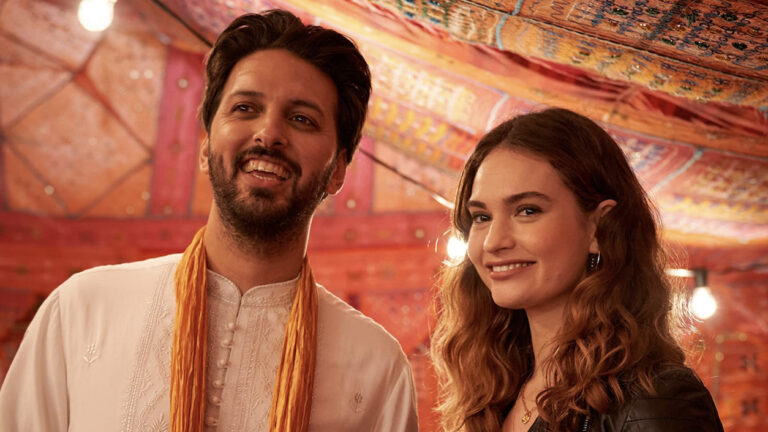
Synopsis : How do you find lasting love in today’s world? For documentary-maker and dating app addict Zoe (Lily James), swiping right has only delivered an endless stream of Mr. Wrongs, to her eccentric mother Cath’s (Emma Thompson) dismay. For Zoe’s childhood friend and neighbor Kaz (Shazad Latif), the answer is to follow his parents’ example and opt for an arranged (or “assisted”) marriage to a bright and beautiful bride from Pakistan. As Zoe films his hopeful journey from London to Lahore to marry a stranger, chosen by his parents, she begins to wonder if she might have something to learn from a profoundly different approach to finding love.
Rating: PG-13 (Some Suggestive Material|Brief Drug Material|A Sexual Reference|Strong Language)
Genre: Romance, Comedy
Original Language: English
Director: Shekhar Kapur
Producer: Nicky Kentish Barnes, Tim Bevan, Erci Feller.
Writer: Jemima Khan
Release Date (Theaters): Limited
Runtime:
Distributor: SHOUT! STUDIOS
Production Co: StudioCanal, Instinct Productions, Working Title Films
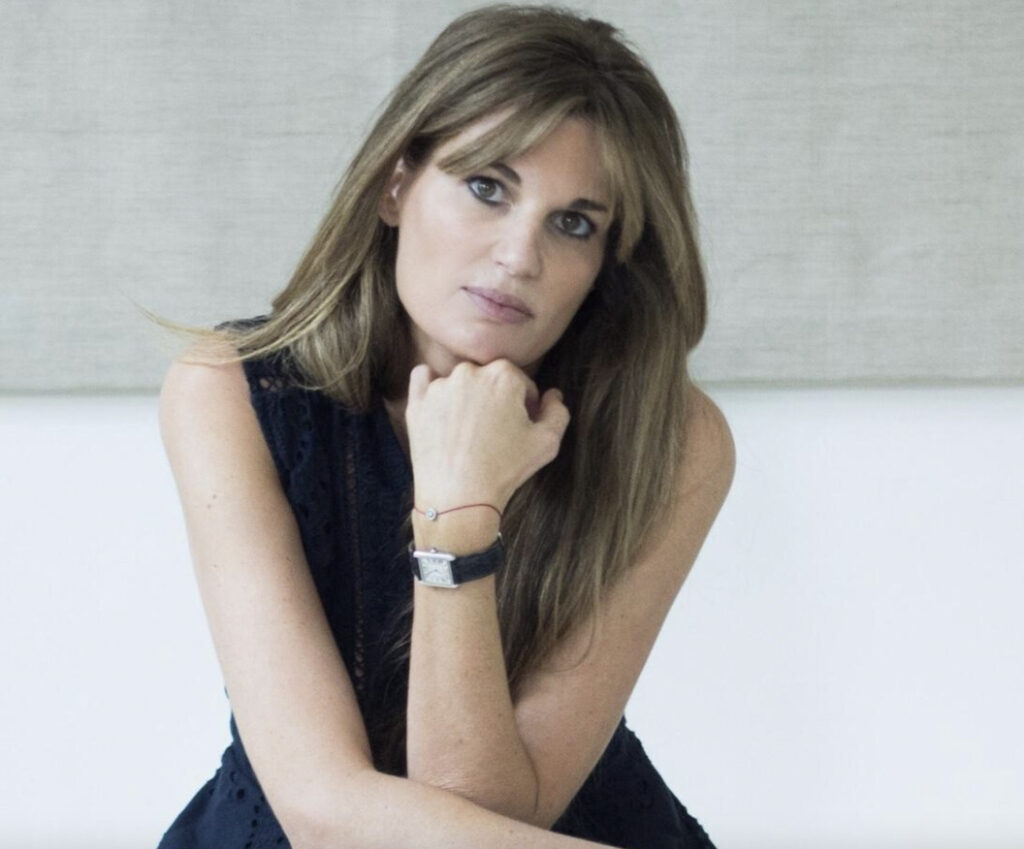
Exclusive Interview with Writer/Producer Jemima Khan
Q : You’ve had a quite interesting career. As a journalist, you become an editor at the British Vogue and Vanity Fair. Also, you established a production company, Instinct Productions, which is working with Alex Gibney. How did you come to write this story about Pakistan? It’s an interesting dynamic — talk about the process of developing the concept of this film?
JK: All the things on the Instinct slate are stories that I relate to personally. For example, we made a documentary series, “The Case Against Adnan Syed,” based on the serial podcast that was for HBO in America. At the time I embarked on a project, I included my son who is British-Pakistani, not American. Like the main character, he was exactly the same age as Adnan was when he was incarcerated. His incarceration had a lot to do with Islamophobia, as it now turns out, in the way the case unfolded. He’s now been set free.
You probably don’t know this but, I lived in Pakistan for more than 10 years. I got married when I was 20 to a Pakistani guy [Imran Khan] and lived with his entire family including his father, sisters and their husbands in a big joint family system. It kind of felt like I grew up there because I was so young when I went. They all had arranged marriages. Ours was the only non-arranged marriage in his entire family history. Wow. I came to a different understanding of what an arranged marriage looked like, particularly with the younger generation.
I was very close to his niece, who was just a little younger than me. She went on to have what has come known as an assisted marriage. There was something to be said for it in terms of the people that love you most and know you best who put forward several suggested candidates. Then you get to know them and decide whether you like them or not. It doesn’t seem, in retrospect, when I came back, I felt that algorithms and dating through dating apps were just as random a way to choose lasting love, or, arguably, even more random than this method.
The idea for the film really came from conversations that I had with my girlfriends, who, by then, were in their 30s and wanting to settle down and have kids. We would discuss who would be the arranged marriage candidate? If you have functionally sane parents, who would they choose for you? And what would that look like — would it work? That was the original idea for the film.
Q : You had your own vision, a great concept for your script, but you also worked with one of Shekhar Kapur, a great visionary director. How did you collaborate with him? Was there any point that he wanted to go in a different direction from the script, but you wanted to stick to the actual script. Was there any situation like that — how did you collaborate with him?
JK: We collaborated really well. We both care passionately about our creative endeavors. Oh, there’s always going to be some tension there. I would say that Shekhar is less interested in the calm bit of the rom-com and he’s extremely interested in… I think he’s very good at making audiences feel something. Shekhar is not your standard comedy director; he’s not the first person that you’d go to direct a rom-com and yet that’s why I think the film works on a slightly different level.
People are sometimes quite surprised by it because there’s a sort of emotion to it that he brought in as a director that someone else might not have [done]. For audiences, I feel that with this film, we found people that both laughed and cried.
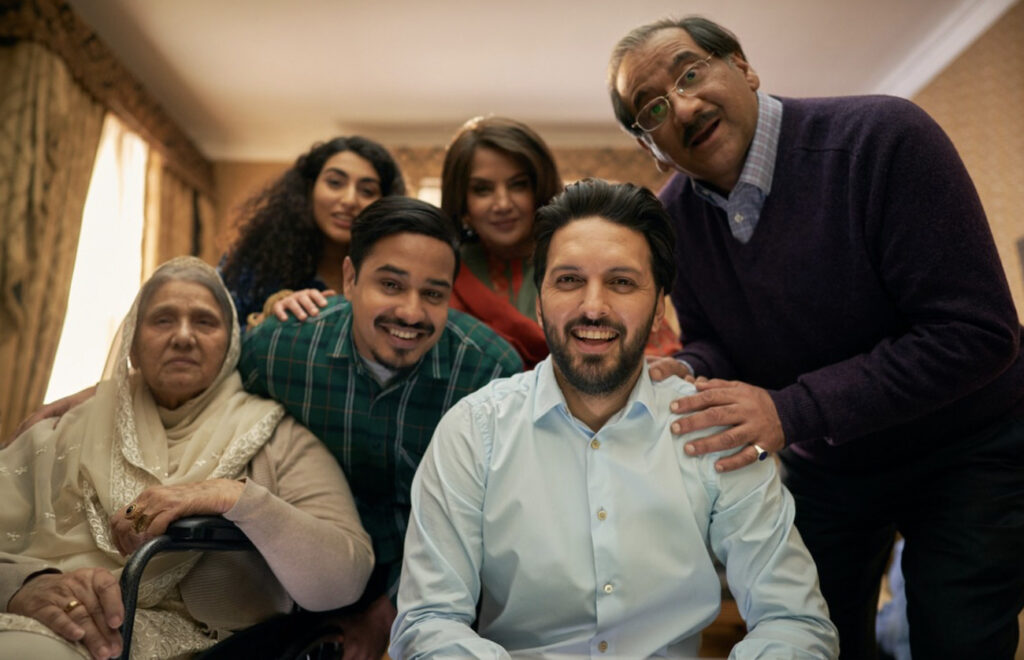
Q : What’s amazing about this film is the voice of the female characters. Zoe [played by Lily James] captured the voice of a woman in the arranged marriage through her perspective. The voice of the mother expresses her caring about the child. How consciously did you develop that element of women’s voices in the film?
JK: I really like using the fairy tale device for Zoe’s voice. This idea that women are told from a very young age what effect a child looks like [has on them] and that they might find fairy tales generally quite worrying. I think the fairy tales that were told to us as children about aiming for a handsome prince are all wrong. So I really enjoyed having that narrative run through the film and have her subvert those stories to tell her own story, to explain her own journey.
Q : When Kaz’s family was with the arranged marriage agent Mo, the matchmaker, it’s interesting how you show that all those characters, the mother and father, have different viewpoints as to what the wife should be or what they wanted as a wife. The film shows a different perspective of each of the characters. Could you talk about creating that sequence with Mo, the matchmaker character? How it incorporates a lot about Pakistani culture [in general], not just the arranged marriage aspect.
JK: I love Mo, the matchmaker character. He’s such a funny guy. Asim Chaudhry, who plays the role of the matchmaker, does a very well-known mockumentary show in the UK called “People Just Do Nothing.” My kids are actually obsessed with him. One day they said, “Why is he not in the film?”
And I said, “I don’t think there’s a part for him.” Anyway, I then reached out to him through a direct message on social media and said, “Would you ever consider it?” And we wrote that part especially for him. He has such a following — kids in the UK are obsessed by Asim and hopefully you get a little glimpse in the movie of why he’s so great. Everything he says cracks me up.
Q : Even though you’re not directing a film, you’re the writer and producer of the film. How much were you involved in the casting process? Were they the specific choice in mind when you cast Lily James and other characters like Shazad Latif?
JK: As a producer, I was pretty involved in the casting, a part of that process. Obviously the director has the main input when it comes to who he wants in his film. But I was part of all those auditions and saw them all take place. There were a couple of times where I had to find people at the last minute because of Covid. With the Nani Jan character, the woman who was playing the grandmother dropped out at the last minute because her family didn’t want her to act during Covid.
I had to find somebody so I just emailed the entire cast and said, “Help. Does anyone know someone?” We were days away from filming scenes with her in it. I emailed the whole cast and said, “Does anyone know anyone?” We were in a panic. It was right during the worst, most brutal lockdown in England. Jeff, who plays the dad, emailed me back and said, “I know someone.” And He sent me a tape, a random tape of this woman singing. We were desperate so we just took her. Anyway, he didn’t tell us that she’d never acted before. She was his mom but turned out to be great.
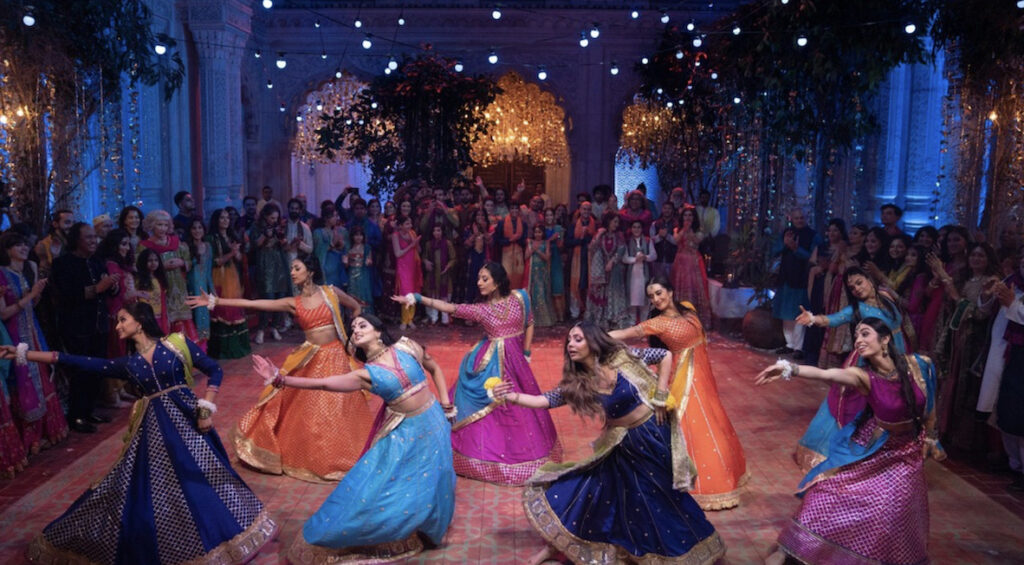
Q : It definitely was a significant moment. You’ve worked as a journalist, an editor of a fashion magazine and established your own production company — someone with a very versatile perspective. What kind of things are you looking for when it comes to a project? How do you choose the next project?
JK: I always choose projects that, because my company’s pretty small, I will be happy to devote myself to for several years. It has to really mean something to me so I did a documentary with Monica Lewinsky on her story which was called “The Clinton Affair.” We did the first documentary series, then I was a producer on the Ryan Murphy impeachment TV series. That was really important to me, the story of a woman wronged by society because she was so vehemently demonized.
At some point, we were almost the same — we’re pretty much the same age. I remember it very clearly. That was one of the things [I was interested in] — true stories often appeal to me, ones with strong female leads. I like stories about demonized people, wrongly demonized women, minorities, even [misunderstood] countries. When I wrote this film, I wanted to do a rom-com about Pakistan because I felt that the country has also been unfairly demonized on the world stage, certainly on screen. I wanted to show a bit more of the color and gloss and the fondness I have of Pakistan that you really don’t see on screen here.
Q : It’s incorporated throughout the film, Pakistani culture and all that. The statistic cited in the film that divorce rate in England is more than 50% was surprising. With arranged marriage it’s only like 6%. Do you think that arranged marriage has such a lower divorce rate because it’s already passed the judgment of the parents or because it’s often set up by the parents?
JK: It’s both. There’s more of a stigma to divorce in traditional societies. I think that when the families know the family of the boy or girl, then there’s more of the family working behind the scenes to keep the couple together. I also think that when you take out that magical thinking about love — like love at first sight and the idea that someone’s going to complete you or there’s some transcendental, mythical love that we’ve been fed by rom-coms — [then it’s different]. If you take that quite unrealistic component away, I think that you probably are looking at whether two people are compatible and that ultimately is more important. So I think it’s a bit of both.
Q: This film portrayed Pakistani culture but at the same time its scenario is very universal. Could you talk about what you want the audience to take away from this film?
JK: I’d like people to enjoy it first and foremost because it’s a rom-com and it’s about escapism and enjoyment. If it in some way ends up challenging some preconceived notions in the process, then that’s a great bonus.
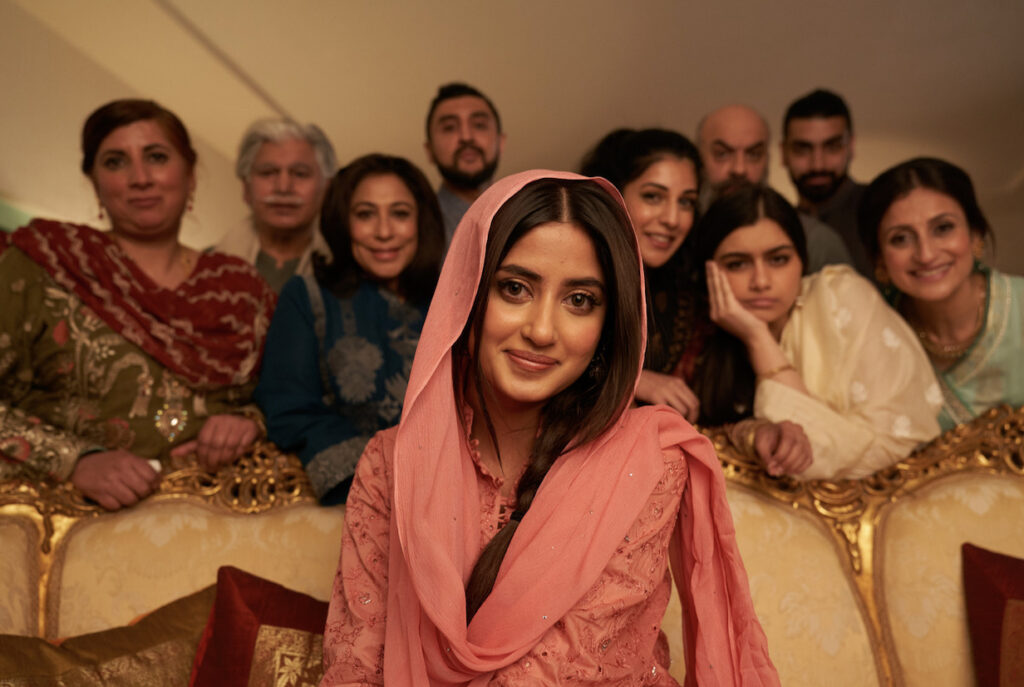
Check out more of Nobuhiro’s articles.
Here’s the trailer of the film.

